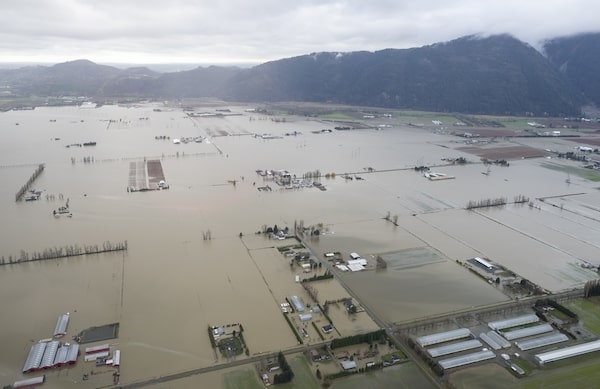
Floodwaters in Abbotsford, B.C., on Nov. 23, 2021.JONATHAN HAYWARD/The Canadian Press
British Columbia has released its long-awaited climate adaptation strategy, promising half a billion dollars to protect communities from the kind of extreme natural disasters that occurred last year, though critics say the province can’t be measured on its progress without specific targets or goals.
The plan, announced on Monday, says B.C. will invest in climate-resilience projects including floodplain mapping, wildfire prevention and extreme heat preparedness.
The strategy has been in the works since 2018 and was supposed to be ready in 2020. In 2021, while the plan was still on the drawing board, the province saw a severe heat wave that killed 619 people, wildfires that consumed the community of Lytton, and unprecedented, catastrophic flooding.
“Everyone in B.C. who experienced last summer and fall knows that our province is on the frontlines of the climate crisis,” George Heyman, Minister of Environment and Climate Change Strategy, told a news conference on Monday. “That’s why we’re taking coordinated action across all ministries to be better prepared this year, next year and on into the future.”
Mr. Heyman said the province has used preliminary risk assessments to assess the most urgent needs. Most of the initiatives have already been announced, such as the decision to make B.C.’s wildfire service a year-round operation, and additional staffing and resources for the River Forecast Centre. The province also unveiled its extreme heat alert system earlier this month, just ahead of a critical report from the coroner’s service on last summer’s heat-wave deaths.
BC Green Leader Sonia Furstenau said in a statement that the document would be better if it had concrete targets and timelines, which she said should have come sooner.
“The BC NDP [government] had ample evidence that these events were coming, such as the 2019 Strategic Climate Risk Assessment. If these changes had been implemented sooner, we might have been better able to respond to the disasters of the last year,” Ms. Furstenau said.
The strategy paper says investments in adaptation, which includes $221-million in this year’s budget, will save money down the road.
“Proactive investments can help us avoid higher costs and limit hardships associated with both climate-related disasters and slow-onset climate changes,” it reads.
Andrew Gage, staff lawyer for West Coast Environmental Law, said the province isn’t investing enough.
“B.C.’s new climate plan is a long overdue important step forward, but is still only a fraction of what is needed to keep our communities safe,” Mr. Gage said, pointing to a 2020 study by the Insurance Bureau of Canada that calculates local governments across the country would need to spend $5.3-billion per year to avoid the worst impacts of climate change.
The B.C. plan has been released just months ahead of a national adaptation strategy, which has been promised by Ottawa by the end of the year.
Last month, the Canadian Climate Institute set out its recommendations for the national adaptation strategy. It is calling for Canada to determine its priorities based on risk. The country should identify the top national climate-change risks and include a plan for tracking progress and reporting on outcomes, according to the institute.
Sarah Miller, who co-authored the recommendations, said in an interview Monday that British Columbia’s version is missing those key details.
“B.C.’s plan doesn’t really measure up,” Ms. Miller said. “The actions are all worthwhile to do, but it doesn’t include measurable goals, and there are no outcomes to measure progress. It’s going to be really hard to assess how we are doing, and how ambitious B.C. is with this plan.”
Meanwhile, the province is still working on the development of a comprehensive provincial flood strategy and flood-resilience plan – which was promised last November after devastating floods across southern B.C.
“We’re planning to have the floods strategy ready next year as well as the B.C. flood resilience plan, which will include consideration of new diking needs by 2025,” Mr. Heyman said.
The province points to recent scientific studies that concluded the extreme events of 2021 were made much more likely by climate change.
A paper in the June edition of Weather and Climate Extremes says the atmospheric river that caused flooding in southwest B.C. last year was made at least 60 per cent more likely as a result of human-induced climate change.
Likewise, the extreme heat wave “was found to be virtually impossible without human-caused climate change,” according to a study currently under review for the journal Earth System Dynamics – which warns that such events will become increasingly more likely and more intense as the climate continues to change.
We have a weekly Western Canada newsletter written by our B.C. and Alberta bureau chiefs, providing a comprehensive package of the news you need to know about the region and its place in the issues facing Canada. Sign up today.